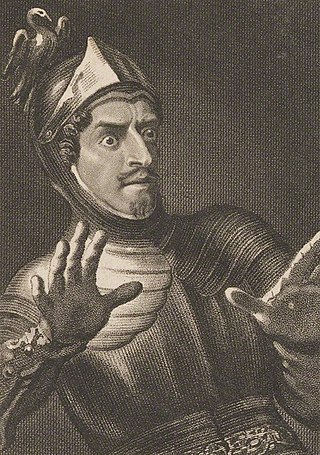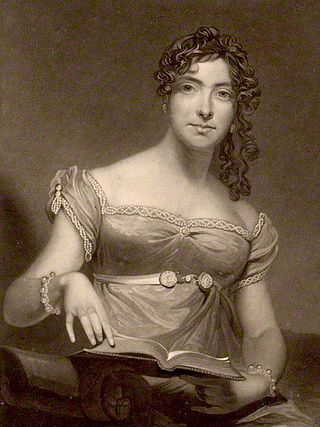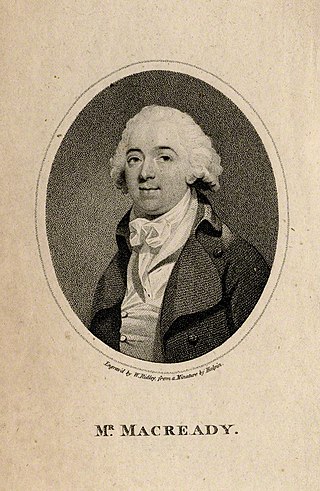This article contains information about the literary events and publications of 1817.

William Farren was an English actor, who was the son of an actor of the same name, who played leading roles from 1784 to 1795 at Theatre Royal, Covent Garden.

Junius Brutus Booth was an English stage actor. He was the father of actor John Wilkes Booth, the assassin of U.S. President Abraham Lincoln. His other children included Edwin Booth, the foremost tragedian of the mid-to-late 19th century, Junius Brutus Booth Jr., an actor and theatre manager, and Asia Booth Clarke, a poet and writer.

Helena Saville Faucit, Lady Martin was an English actress.

The first theatre in New York City to bear the name The Winter Garden Theatre had a brief but important seventeen-year history as one of New York's premier showcases for a wide range of theatrical fare, from variety shows to extravagant productions of the works of Shakespeare. Initially known as Tripler's Hall or Metropolitan Hall, it burned down in 1854 and was rebuilt as The New York Theatre. Although it burned to the ground several times, it rose from the ashes under different managers, bearing various names, to become known as one of the most important theatres in New York history.
William Michael Rooke was an Irish violinist and composer.

Thomas Cobham (1786–1842) was a British actor.

Sarah "Sally" Booth was an English actress.

William Macready the Elder (1755–1829) was an Irish actor-manager.

Town and Country, or Which is Best? is an 1807 play by English playwright Thomas Morton. It was regularly performed in England and America during the 19th century.

John Michael Vandenhoff was an English actor. He performed in London theatres, and also in Edinburgh and Liverpool; he played leading roles including those in Shakespearean tragedy.

Adelgitha is a tragedy by the British writer Matthew Lewis. It premiered at the Theatre Royal, Drury Lane on 30 April 1807 having originally been published the year before. The cast included Henry Siddons, Robert William Elliston, George Frederick Cooke and Jane Powell while the incidental music was composed by Michael Kelly. It was one in a run of Gothic plays Lewis produced following the success of The Castle Spectre. The play is set in Otranto around 1080 which was ruled over by Robert Guiscard following the Norman conquest of southern Italy.

The Youthful Days of Frederick the Great is an 1817 stage melodrama by the British writer and actor William Abbot. It premiered at the Theatre Royal, Covent Garden in London on 2 October 1817. The cast included Daniel Terry as Frederick William, King of Prussia, Abbot as The Prince Royal, Daniel Egerton as Baron Kniphausen, Chapman as Count Seckendoff, Charles Connor as Anhalt, Charles Farley as Frederstoff and Harriet Faucit as Christine.
Fredolfo is an 1819 historical tragedy by the Irish writer Charles Maturin. It premiered at the Theatre Royal, Covent Garden in London on 12 May 1819. The original cast included William Macready as Wallenberg, Charles Mayne Young as Fredolfo, Charles Kemble as Aldemar, Frederick Henry Yates as Berthold, Charles Connor as Waldo and Elizabeth O'Neill as Urilda. Maturin dedicated the published version to the Duke of Leinster, which was published by Archibald Constable. The work was considered a failure which failed to recaptured the success of his earlier Bertram and Maturin turned back to writing novels.

Rugantino is an 1805 melodrama by the British writer Matthew Lewis. An afterpiece, it was originally staged at the Theatre Royal, Covent Garden on 18 October 1805. It was inspired by the 1801 French play L'Homme à Trois Visages by René-Charles Guilbert de Pixérécourt. The original cast included Charles Murray as Andreas, Duke of Venice, John Liston as Meme, William Abbot as Poole, Henry Erskine Johnston as Rugantino and Isabella Mattocks as Camilla. It premiered in Ireland at Dublin's Crow Street Theatre on 26 January 1807. It was revived at Drury Lane in 1820 with a cast featuring James William Wallack as Rugantino, Thomas Cooke as Contarino, William Oxberry as Memme, John Pritt Harley as Stephane, Walter Maddocks as Harald, Sarah Sparks as Camilla and Charlotte Tidswell as Bettina.

The Poor Gentleman is an 1801 comedy play by the British writer George Colman the Younger. It premiered at London's Theatre Royal, Covent Garden on 11 February 1801. The original cast included Charles Murray as Lieutenant Worthington, Thomas Knight as Corporal Foss, Henry Erskine Johnston as Sir Charles Cropland, George Davenport as Warner, Joseph Shepherd Munden as Sir Robert Bramble, William Thomas Lewis as Frederick Bramble, John Waddy as Humphrey Dobbins, John Emery as Stephen Harrowby, John Fawcett as Doctor Ollapod, Maria Gibbs as Emily Worthington and Isabella Mattocks as Lucretia MacTab. It was revived in 1829 at the Theatre Royal, Drury Lane. In 1845 it appeared at the Chestnut Street Theatre in Philadelphia and the Park Theatre in New York.
Retribution is an 1818 British tragedy by the writer John Dillon. It premiered at the Theatre Royal, Covent Garden in London on 1 January 1818. The original London cast included Charles Mayne Young as Veranes, King of Persia, William Macready as Chosroo, Charles Kemble as Hamed, Daniel Egerton as Abdas, William Abbot as Hafiz, Daniel Terry as Suthes, Charles Connor as Sohrab and Elizabeth O'Neill as Zimra.

Fazio is a tragedy by the British writer Henry Hart Milman. It was first published in 1815. An unauthorised adaptation was performed at the Surrey Theatre under the title The Italian Wife. Another unauthorised version was performed at the Theatre Royal, Bath. In 1818 Milman granted permission for the Theatre Royal, Covent Garden to stage the play. It premiered there on 5 February 1818. It starred Charles Kemble as Giraldi Fazio, Elizabeth O'Neill as Bianca, Daniel Egerton as the Duke of Florence, Charles Mathews as Gonsalvo, William Blanchard as Bartolo, Harriet Faucit as Aldabella and Charles Connor as Falsetto. A first Dublin performance took place at the Crow Street Theatre on 6 April 1818. Fanny Kemble later played Bianca in Britain and America, where she appeared at the Park Theatre in 1832. It was revived on both sides of the Atlantic over the following decades.
A Word to the Ladies or A Word for the Ladies is an 1818 comedy play by the British writer James Kenney. It premiered at the Theatre Royal, Covent Garden on 17 December 1818. The original cast included William Macready as Winterland, Charles Mayne Young as Larum, Charles Kemble as Dorrington, Elizabeth Yates as Miss Singleton, Harriet Faucit as Clara Winterland, Charles Connor as Adamant, William Abbot as Young Bowerscourt, William Farren as Old Bowerscourt, John Liston as Silvertongue and John Emery as Snugg.

The Touchstone is an 1817 comedy play by the British writer James Kenney. It premiered at the Theatre Royal, Drury Lane in London on 3 May 1817. The original cast included Charles Holland as Finesse, James William Wallack as Garnish, John Pritt Harley as Paragon, William Dowton as Probe, William Oxberry as Croply, Frances Maria Kelly as Dinah Croply, Sarah Harlowe as Mrs. Fairweather and Frances Alsop as Miss Becky. It's Irish debut was at Dublin's Crow Street Theatre on 16 February 1818.















